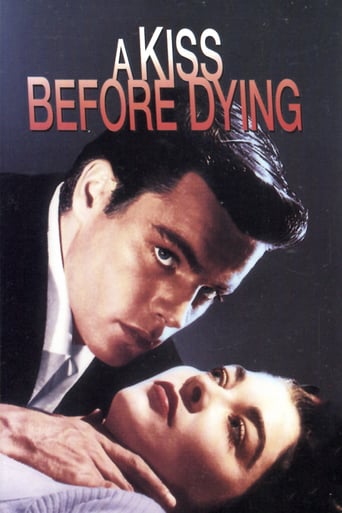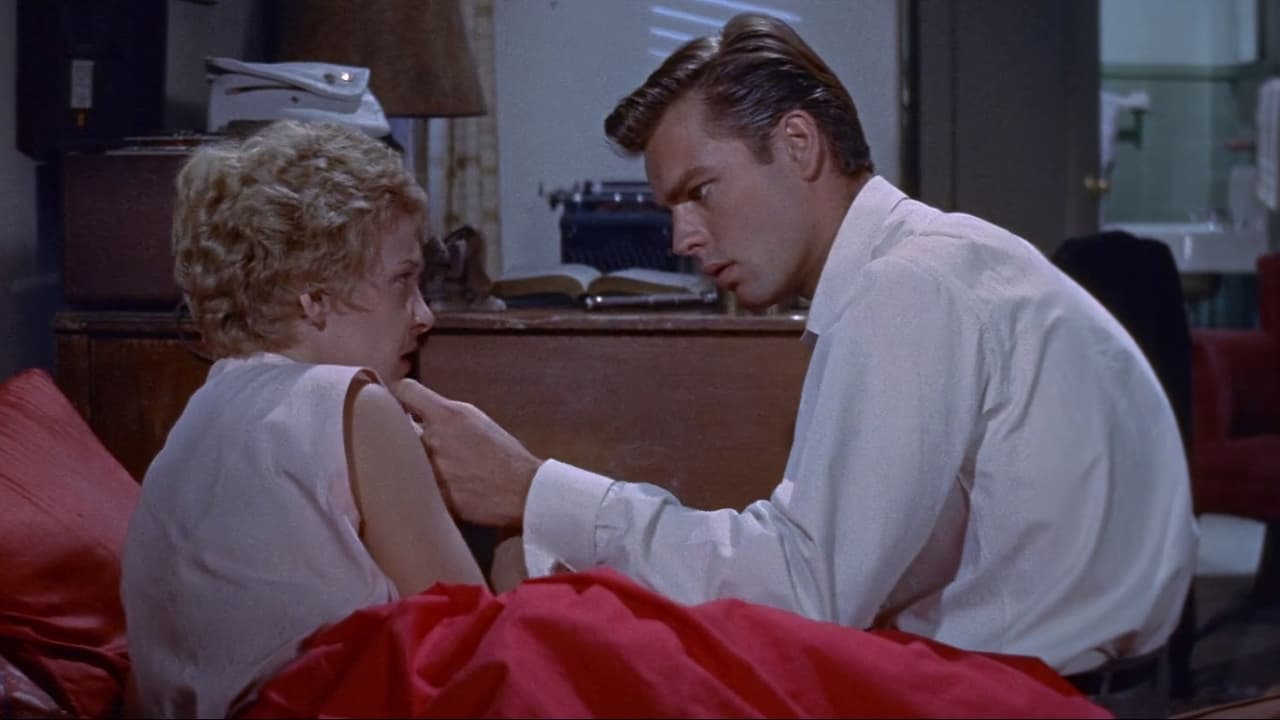joe-pearce-1
This is a film very much of its time and it is almost impossible to convey the surprise it would have engendered back then in audiences when it gave us Robert Wagner as a cold-bloodied psychopath, Mr. Wagner having previously been cast, usually to excellent effect, only as admirable and good-looking (very) young men. Reviewers keep comparing its story line to PSYCHO's, but that is pure nonsense. First viewing PSYCHO when it came out, you had no idea that teen semi-idol Anthony Perkins was the killer; the only non-narrative shock element in it was having star Janet Leigh killed off by the end of the film's first half. Seeing Wagner as a psychopath back in 1956 had that same kind of stunning non-narrative shock for viewers, especially since we know he's the bad guy almost from the opening frame. Also, although the story is pretty dark, it is not a noir because noirs almost always depend on an innocent, or at least anti-heroic, male lead who gets into trouble because of, and is often destroyed by, a femme fatale. In this film, there is only one fatal character and it is the male lead. Wagner does it very well, Joanne Woodward is moving as his (first) victim, and even beautiful Virginia Leith comes over pretty well. Jeffrey Hunter as a young, pipe-smoking college professor comes over basically, given his later career identification, as a young pipe-smoking and beardless Jesus Christ, with glasses! But the film is quite good. What keeps it from being truly memorable or even great is that it is based on one of the very great mystery novels of the period by Ira Levin (his first success, and long before ROSEMARY'S BABY, THE STEPFORD WIVES and THE BOYS FROM BRAZIL, it quite literally made his name), and that novel has one of the greatest of all surprises in a mystery novel midway through it, one that could make you drop the book in shock while exclaiming, "Oh, my God!", but it is that effective because you are reading a narrative in which the author can disguise certain plot elements in words, and the shock cannot be duplicated on the screen by virtue of the fact that you can actually SEE the characters going through all their machinations, so that such surprise elements cannot be hidden from the viewer. Too bad, though, because if a writer/director could come up with a way to duplicate Levin's written surprise, he might have a totally brilliant mystery film to offer. In fact, it's nearest relationship to many of Hitchcock's later films is that it is a beautifully filmed daylight thriller. Indeed, most of the worst things in the film happen around noontime, in broad daylight and in glorious Technicolor, and that can be hard to pull off. It is pulled off very well here, indeed. Finally, since I am of the film's period, I can attest to the fact that this movie really does provide a legitimate 1950s atmosphere - visually, ethically and morally. You wouldn't really be all that surprised to see Dwight D. Eisenhower walking through Robert Wagner's college campus!
treywillwest
A striking cross between gritty Noir and colorful-if-sad '50s family melodrama, this is a unique and, I think, rather complex Hollywood movie. The sociopathic anti-hero (protagonist-villain?) seems to be a wholesome stud-muffin who wants the American dream: financial independence, indeed wealth. A dark variation on the Rebel Without a Cause, he is fatherless and the Oedipal tension with his mother is not subtle. Indeed, the first of his girlfriends that we meet has a striking similarity to Mom. His chosen path to affluence is to marry into money, and each time the rich chicks he dates do something that alienates their wealthy families, like getting pregnant out of wedlock, he kills them in retaliation. His murders are not a way to procure wealth but a way to free himself from romantic obligations that will not bring wealth. Thus, his criminal actions can be seen as a result of social prohibitions on divorce and abortion, at least as much as of misogyny. The killer is then simultaneously a patriarchal abuser and a rebel against patriarchal morality. The killer is brought down by a group of conspirators working with one of the victim's viciously patriarchal, capitalist father. He dies in a subterranean excavation in the dessert and his crimes, and the embarrassment to a "proper family" that would come with their revelation, are buried with him. The ending is "happy" exactly because all the horror of American society remains hidden behind the face of patriarchal "normalcy."
Robert J. Maxwell
Robert Wagner, a handsome and clever young student at an Arizona university, takes up with desperately lonely and prodigiously mousy Joanne Woodward. She's the daughter of George Macready, who is filthy rich. But the feckless Woodward becomes pregnant, which doesn't auger well for the couple's being blessed by straight-laced Dad. That is, if she gets knocked up and elopes in violation of the norms of the rich, she's disenfranchised.So Wagner sensibly takes his adoring girl friend to the Marriage License Bureau and then, finding the office closed for lunch, guides her to the roof and flings her off.If at first you don't succeed, try, try again, they say, so Wagner, oozing a sleazy charm, pitches woo at Macready's OTHER young daughter, Virginia Leith, and courts her properly.Leith, though, suspects that her sister's death is murder, not the suicide it appears to be. She seeks out one of Woodward's former beaux. He is sympathetic and is about to give Leith the identity of another of Woodward's boyfriends, namely Wagner himself, but Wagner shoots him dead and plants a suicide note on him.Meanwhile, in the background of all these machinations, detective Jeffrey Hunter is prowling around trying to uncover the truth. Finally he settles on Wagner. At the end, standing on the lip of a deep mining pit, Leith has determined that Wagner is the guilty party because she catches him in a not-quite inculpating fib. She accuses him. He confesses instead of sticking to his story. She doesn't believe him. So he tries to throw HER off the cliff -- but she's rescued at the last minute by Hunter and Macready, and Wagner falls to his well-deserved doom.It's a pretty decent murder story with no outstanding elements except Wagner's character. "Psychopath" was a much overused term a generation or two ago, so the shrink industry has tried to refine it, going through "sociopath" to the current "anti-social personality," which doesn't quite fit the template of a psychopathic personality. These are guys (mostly) who have no moral qualms, who think only about themselves, experience no anxiety except the most shallow, and don't know the meaning of the word remorse. Wagner's character is close to perfect, at least in the area of using his good looks, charm, and pheromones for pecuniary purposes.His performance is adequate, as always, and perhaps better than that. The use of that boyish smile to get him out of tight spots contrasts nicely with his self-interested blank when he's alone. Ditto for the other principals. Macready's facial and vocal default position is icy disdain. When he talks in his sleep it sounds haughty. Now, when he actually tries to PROJECT icy disdain, he comes across like Alice's Red Queen. Virginia Leith is attractive and elegant and can't act. The sound is tinny and the photography has the flat values of a television movie.The direction by Gerd Oswald is functional and avoids some of the usual clichés. Two examples: (1) Wagner, all smiles, wants to coax something out of his loving mother so he invites her to choose the tie he's going to wear today. When she gives him what he wants and then leaves, his smile disappears and he matter-of-factly replaces the tie she's picked with another of his own choosing. (2) Wagner walks up to a face mirror, the camera shooting over his shoulder, and grooms himself -- and the mirror is NOT set at an oblique angle, so we do NOT see Wagner's face staring directly at the audience. I wanted to applaud, but then it occurred to me -- unless -- unless -- is Gerd Oswald such a newbie, such a clumsy and innocent tyro, that he's unaware of the cliché and just hasn't THOUGHT of it? Lord, I hope not. I hope he thought it through and came out the other side. At the same time, I can't help imagining what Hitchcock would have done with Ira Levin's plot. In superficial ways it resembles "Psycho" and is reminiscent of "Shadow of a Doubt."Robert Wagner is a nice guy. To his friends he's "R.J." He was my supporting player in the superlative and unjustly vilified miniseries "Windmills of the Gods." Oh, I tried to teach the kid a few thespian tricks but I never really got the chance because the closest I came to him was brushing shoulders. What a long resume he has. George Macready, too, had a long and fruitful career on the screen, always more or less the same character, but we need those kinds of actors. It's reassuring to see them. They're fixed points in a changing and baffling universe.
JohnHowardReid
I always thought this was a 20th Century-Fox production. All the stars were under contract to Fox at the time and so were most of the technical personnel. Gerd Oswald does a great job, building suspense to breaking point and making most effective use of the wide screen to pointedly capture his locations in Tucson and elsewhere in Arizona, and yet emphasize the disturbing emotional distance between his players by often placing them right against opposing frame lines (a clever device that has been outlawed since the mid-1970s because of the demands of TV syndication). True, Oswald had never directed a cinema movie before, although he did have extensive experience as an assistant director and had directed two TV episodes.Robert Wagner gives a startlingly compelling performance as the killer (he is identified right from the start) and receives outstanding support from the lovely Virginia Leith. Also most effectively cast is Joanne Woodward, and in a minor role but key scene, Robert Quarry. Like Wagner, Jeffrey Hunter is also cast against type, but he is less impressive and tends to over-use his prop spectacles.Although Lionel Newman's score and his title song (lyrics by Carroll Coates, sung by Dolores Hawkins) have been criticized, I found both very suspenseful.



 AD
AD




